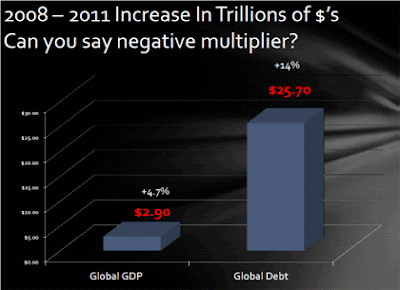Here is a good example of putting numbers in context courtesy of Charles Biderman of Trim Tabs.
Over the past year, take home pay for everyone who pays taxes is up something over $100 billion per year, or about 2% to 3% to $6.3 trillion and that $100 + billion gain does not even keep up with the current 3%+ inflation rate.
On the other hand US stocks are up over $3 trillion or 20% since the early October market low. That $3 trillion is an amount equal to all of the take home pay for all taxpayers over the past six months. Let me repeat that staggering number. The value of all stocks grew, which means an extra, $3 trillion since early October and the take home pay for everyone who pays taxes was about the same $3 trillion! Shareholders are racing ahead and getting rich and everyone else is sucking wind.It does make you wonder where all the money is coming from. Perhaps this is the answer.
We keep hearing about the need for stimulus (translation-more borrowing and more debt). How is that working? Since 2008, global GDP has grown 4.7% or $2.9 trillion. However, global debt has increased 14% or $25.7 trillion over that same period according to Money and Markets. This means that almost 89% of this debt stimulus is no where to be found in an improved global economy. How is it that this debt is going to be paid off in the future?
Since October the Federal Reserve has printed about $600 billion of new money to pay the US government’s deficit. That is the only source of new money for the US economy. Does the Fed printing big bucks justify a $3 trillion increase in the market value of all US stocks? Not to me.
 |
| Source: Money and Markets |
Finally, a little context on Greece. Last week saw violent protests in the streets in Athens. Greece was literally in flames as protestors objected to the need to cut another 150,000 public sector jobs over the next three years. Let's put that in context.
Greece's population is 10.7 million. The United States has a population of about 312 million. Cutting 150,000 public sector jobs in Greece would be like eliminating 4.4 million public sector jobs in the United States. There are about 2.3 million federal government civilian employees. There are about 5 million state employees combined in all 50 states. Therefore, if we would have to do something similar to what Greece is now faced with, we would have to eliminate over 50% of all federal and state government jobs. And public sector employees in the United States are upset about losing collective bargaining involving their benefits?
We have not yet begun to see what is going to be necessary in this country to deal with our deficits. If anyone is content with what is happening right now in this country, they have no context.

No comments:
Post a Comment